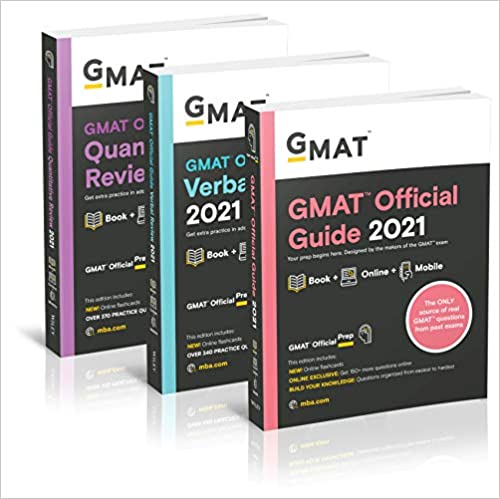How to get a perfect score on the GMAT
Perfection is Possible
I'm surprised that so few people get perfect scores on the GMAT exam. Each fall, when business schools release their full range of GMAT scores from admitted applicants, there is virtually never an 800 on the list. The highest number I see is a 780 or 790. Why no 800?
I'm not saying that it's easy to get a perfect score, but there are lots of good test takers out there who are within reach of perfection, and all they need on any given day is a little luck. Why then is it that so few MBA applicants pull it off?
Test-Prep Companies
Some of the blame can be put on test-prep companies. For obvious reasons, their courses are designed to address the middle of the curve. They need to teach material that applies to all students in their classes without intimidating those who are struggling. So by their very nature, large commercial test-prep companies can't spend a lot of time on the hardest concepts.
Additionally, few instructors at test-prep companies can do the hardest problems themselves. It takes time to get really good at the curriculum. (I know this from firsthand experience.) But you would think more applicants would master the problems—or at least get lucky on test day.
I started teaching the GMAT exam at the Princeton Review in Los Angeles, and I took my role seriously because I knew that my students' scores would, in large part, dictate their career opportunities. Before long, I was training the company's new instructors and deciding who was good enough to teach for us. If I didn't think you were ready to work with GMAT students (our oldest and most demanding demographic), I'd suggest that you teach the SAT exam until you got better.
That experience is why I know that the vast majority of GMAT instructors can't solve every problem on the test. (For the record, neither could I when I started.) And it's yet another reason why so few test takers get perfect scores. The toughest problems aren't covered in prep classes—in part, because most instructors can't solve them.
The GMAT Prep Material is Mediocre
But perhaps the most disturbing reason for underperformance on the GMAT is the material itself. Practice problems created by test-prep companies are often inaccurate and unhelpful—designed to mimic questions that appear on the exam but often flawed because they were written by people who are inadequately trained. I regularly pointed out flaws in question design while at the Princeton Review, not just to the company, but to my students as well.
Developing questions that appear on standardized tests such as the GMAT is a demanding process that's done by trained professionals who profile every problem before it appears on an exam. These are the "experimental questions" on the GMAT. If a question doesn't profile correctly in the experimental phase, it's thrown out.
Unfortunately, test-prep companies don't hold themselves to these same high standards — mostly because they don't always understand what makes a question a valid indicator of student achievement. So they write shitty questions that sort of mimic what they see on actual exams, knowing that their students won't be able to spot the subtle shortcomings. After all, if a test-prep company can't understand what makes practice problems perfectly accurate, how could a student?
The problem, of course, is that students who prepare with inaccurate material aren't sharpening the highly specific reasoning skills that will be tested on exam day — especially the skills that come into play at the top of the curve, where subtle distinctions are so important. It's as if students were preparing for baseball season by playing football. To do well, GMAT test takers need to learn the finer, highly nuanced math and verbal skills that appear only in well-written questions.
In recent years, a number of upstarts have flooded the test-prep market and lowered the quality of practice materials that students are exposed to. Some new players have chosen to use quantity as a differentiator, but my experience with practice books from those companies has been unsettling. Not only are questions written inaccurately, but entire areas of math and verbal that appear in those book aren't tested on the GMAT exam. Studying that material is a complete waste of time.
When preparing for the GMAT exam, the most important thing you can do is use the GMAT Official Guide. I know that the explanations are terrible, but at least the problems themselves are accurate. They come from real GMAT exams, so they've been properly developed and profiled.
What It Takes to Score 800 on the GMAT Exam
A lot of practice.
As I've already said, the test-prep industry isn't set up to produce perfect scores: course are too short, teachers can't solve the hardest problems and materials are flawed. And yet, over time, I was able to learn enough to score 800 consistently. I got there by following five rules:
- Do a huge volume of problems over an extended period of time.
- Use only high-quality practice problems written by the official test writers.
- Practice without ever timing yourself.
- Early in your prep cycle, surrender problems you can't solve and move on.
- Later in your prep cycle, insist on perfection. Getting even a single problem wrong means doing the entire set over again.
Later, I'll share more details on how to train for the most important test of your life, and I'll tell you exactly how I mastered the GMAT. There's nothing particularly brilliant about it, you just need to commit to the process and understand that it will take time. I tell my students that I taught the test for a full year before I thought I understood it completely. You should prepare for an equally long prep season.








